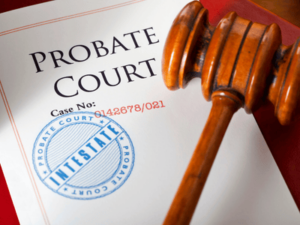Estate planning can feel overwhelming, especially when faced with complex legal jargon. Yet, having a clear understanding of these terms is crucial to ensuring your wishes are honored and your family is cared for in the future.
To help you navigate this essential process, we’ve compiled an A-to-Z glossary of common estate planning terms. With this guide, you’ll not only decode the legal language but also gain the confidence to tackle each step of the process with clarity.
Understanding the terminology will empower you to make informed decisions that protect your loved ones, minimize potential disputes, and secure your legacy for generations to come.
A to Z Glossary of Estate Planning Terms
A
- Advance Healthcare Directive: A legal document specifying your medical care preferences if you become unable to make decisions yourself. This often includes instructions for life-sustaining treatment.
- Ancillary Probate: A secondary probate process required when a decedent owns property in a state other than their primary residence.
- Assets: Everything you own that has value, such as real estate, bank accounts, investments, vehicles, and personal belongings.
- Asset Protection: Strategies used to safeguard assets from creditors, lawsuits, or other risks, often involving trusts or legal structures.
B
- Beneficiary: The person or entity (e.g., a charity) that receives assets from your estate or trust after your passing.
- Bypass Trust: A trust designed to reduce estate taxes by allowing a surviving spouse to access the trust’s assets without including them in their taxable estate.
C
- Codicil: An amendment to a will that modifies specific parts without requiring the creation of a new will.
- Community Property: A form of property ownership in Texas where most property acquired during marriage is owned equally by both spouses.
- Conservatorship: A court-ordered arrangement where a person is appointed to manage the financial or personal affairs of someone who cannot do so themselves.
D
- Disinheritance Clause: A clause in a will specifically excluding someone from inheriting any portion of your estate.
- Digital Asset (Digital Legacy): Any online or electronic asset, such as social media accounts, email, digital photos, cryptocurrency, or cloud-stored files, that can be managed, transferred, or preserved as part of your estate plan.
- DIY Will: A will created without professional legal assistance, often using online templates, which may carry risks of inaccuracy or invalidity.
- Durable Power of Attorney: A specific type of power of attorney that remains in effect if you become incapacitated, allowing someone to manage your finances or legal affairs.
E
- Enhanced Life Estate Deed (Lady Bird Deed): A deed that allows property transfer upon death without probate while retaining control during the owner’s lifetime.
- Estate: The total value of all your assets, including property, cash, and investments, minu
s any debts and liabilities, at the time of your death.
- Estate Planning: The process of organizing your assets, finances, and legal documents to ensure they are managed and distributed according to your wishes after your death or during incapacity.
- Executor: The individual named in your will who is responsible for managing and distributing your estate during the probate process.
F
- Fiduciary: A person or organization legally obligated to act in the best interests of another, such as an executor or trustee.
- Funding a Trust: The process of transferring assets into a trust to ensure it operates according to your wishes.
G
- Generation-Skipping Trust: A trust designed to pass assets to grandchildren or later generations, skipping the children’s generation to reduce estate taxes.
- Grantor: The individual who creates and funds a trust.
- Guardianship: A legal arrangement in which someone is appointed to care for a minor child or an incapacitated adult.
H
- Healthcare Proxy: A person designated to make medical decisions on your behalf if you are unable to do so.
- Holographic Will: A handwritten will that may or may not be valid depending on your state’s laws.
I
- Incapacity Planning: Preparing legal documents to manage financial and healthcare decisions if you are unable to do so yourself..
- Intestate: Dying without a valid will, which means the state decides how your assets are distributed according to its intestacy laws.
- Intestate Probate: The court-supervised process of distributing the assets of someone who died without a valid will, following state intestacy laws.
- Irrevocable Trust: A trust that cannot be changed or revoked after it is created, often used for asset protection and tax benefits
J
- Joint Tenancy: A type of property ownership where two or more individuals have equal shares and survivorship rights, meaning the property automatically passes to the surviving owner(s).
- Jurisdiction: The legal authority that governs estate planning and probate matters in a particular location.
K
- Key Person Insurance: A life insurance policy taken out on an individual whose death would significantly impact the financial health of an estate or business.
L
- Letter of Intent: A non-legally binding document that outlines your wishes, such as funeral arrangements or specific instructions for distributing sentimental items.
- Life Insurance Trust (ILIT): A trust specifically designed to hold and manage life insurance policies and proceeds.
- Lifetime Trust: A trust that holds assets for the lifetime of the beneficiary, often used for minors or individuals with special needs.
- Living Trust: A trust created during your lifetime that allows you to manage assets and bypass probate for a smoother transition of property.
M
- Medicaid Asset Protection Trust (MAPT): A trust designed to protect your assets while ensuring eligibility for Medicaid benefits for long-term care.
- Medicaid Look-Back Period: The five-year period during which Medicaid reviews asset transfers to determine eligibility for long-term care benefits.
- Mutual Will: A will created by two individuals, typically spouses, agreeing on the distribution of their estates and binding on the surviving party.
N
- No-Contest Clause: A provision in a will designed to discourage beneficiaries from challenging its validity by threatening their inheritance if they do.
- Notary Public: A certified professional who verifies the authenticity of signatures on legal documents.
O
- Outright Distribution: Directly transferring assets to beneficiaries without any conditions or restrictions.
- Ownership Rights: Legal rights associated with owning an asset, such as the right to transfer, sell, or gift it.
P
- Per Capita vs. Per Stirpes: Terms defining how assets are divided among descendants if a beneficiary predeceases the testator.
- Probate: The court-supervised process of validating a will, paying debts, and distributing assets to beneficiaries.
- Pour-Over Will: A will that ensures any assets not already in your trust at your death are transferred to the trust.
- Power of Attorney: A legal document that gives someone the authority to act on your behalf in financial, legal, or personal matters, depending on the type of power granted.
Q
- Qualified Terminable Interest Property Trust (QTIP): A trust providing income to a surviving spouse while preserving the principal for other beneficiaries, such as children from a previous marriage.
R
- Revocable Transfer on Death Deed: A deed allowing property transfer upon death without probate, which can be revoked during the owner’s lifetime.
- Revocable Trust: A trust that can be changed or revoked during the grantor’s lifetime, offering flexibility and control.
- Residue of the Estate: The remaining assets in an estate after specific bequests, debts, and taxes have been paid.
S
- Special Needs Trust: A trust designed to provide for a disabled beneficiary without affecting their eligibility for government benefits.
- Statutory Durable Power of Attorney: A legal document, created using a state-approved form, that grants someone the authority to manage your financial affairs and remains effective even if you become incapacitated.
- Successor Trustee: The person who takes over managing a trust after the original trustee is unable or unwilling to do so.
T
- Testamentary Capacity: The legal and mental ability of a person to create or amend a valid will.
- Testamentary Trust: A trust created through a will and activated upon the grantor’s death. Read more: Testamentary Trusts vs. Living Trusts
- Transfer on Death (TOD): A designation allowing certain assets to pass directly to a beneficiary without probate.
- Trust: A legal arrangement where one party (the grantor) transfers assets to another party (the trustee) to hold and manage for the benefit of designated beneficiaries, according to specific terms.
- Trustee: The person or entity responsible for managing the trust’s assets, following its terms, and distributing them to beneficiaries.
- Trust Protector: An optional person appointed to oversee the trustee’s actions and ensure the trust operates as intended, with authority to intervene if necessary.
U
- Uniform Probate Code (UPC): A standardized set of laws adopted by some states to simplify the probate process.
- Undue Influence: Coercion or manipulation that improperly influences someone’s estate planning decisions.
V
- Validity of a Will: The legal requirements that must be met for a will to be enforceable.
- Voluntary Guardianship: A guardianship established at the request of an individual who can no longer manage their own affairs.
W
- Will: A legal document outlining how your assets should be distributed after your death.
- Witnesses: Individuals who observe the signing of a will and attest to its authenticity.
X, Y, Z
- X Trust (Generation-Skipping Trust): A trust that skips one generation to provide for grandchildren, often for tax benefits.
- Yield: Income generated by an asset, such as interest or dividends, within an estate or trust.
- Zero-Out Trust: A trust used to minimize gift or estate taxes by reducing taxable value to zero.
Now That You Know the Terms, It’s Time to Secure Your Legacy
Estate planning doesn’t have to feel intimidating. By understanding these terms, you can approach the process with confidence and clarity. At Hailey-Petty Law Firm, we specialize in simplifying complex legal processes to help you protect your loved ones and secure your legacy.
Ready to take the next step? Schedule a consultation with us today, and let’s start planning your future with confidence and peace of mind.
Disclaimer: This article is for informational purposes only and does not constitute legal advice. For personalized legal assistance, contact Hailey-Petty Law Firm directly.







